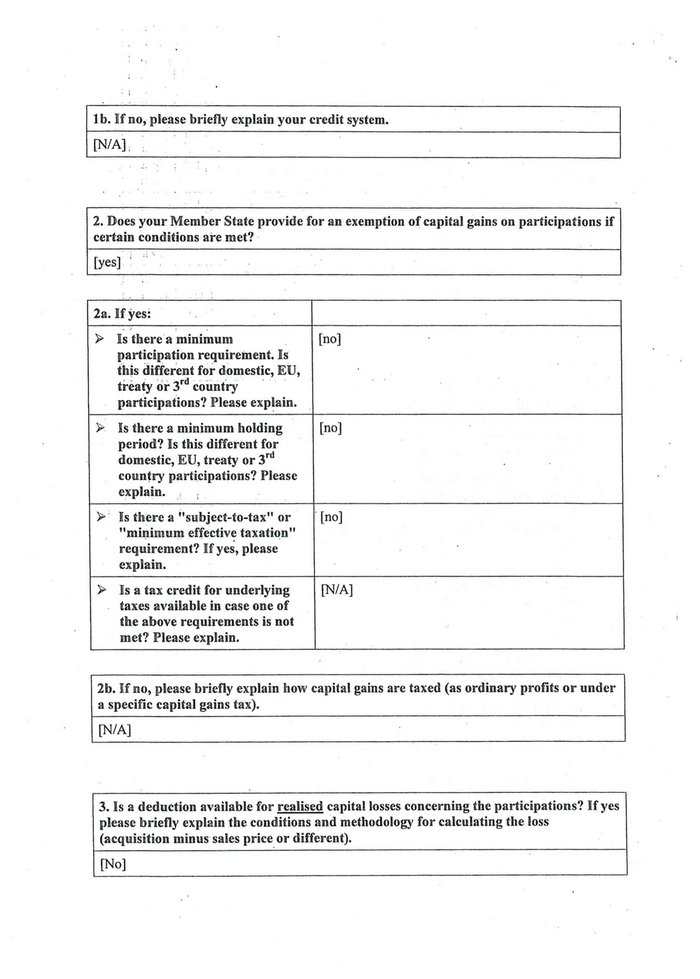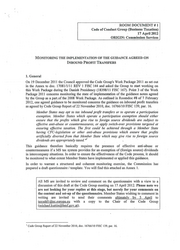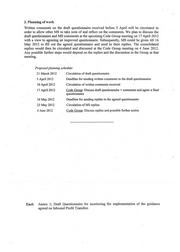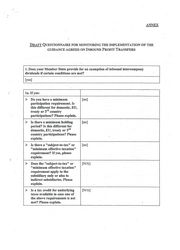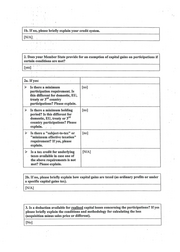coc-1
Dieses Dokument ist Teil der Anfrage „IFG: EU-Gruppe zu Code of Conduct (Business Taxation)“
Page 1 of2 .. '} Hapke, Martina (Pool IV) Von: Wächter, Rainer (IV B 1) Gesendet: Donnerstag, 10. Mai 2012 10:10 An: 'SECRETARIAT DGG Fiscalite'; 'Jaap.TILSTRA@ec.europa.eu'; 'michael.kuttin@bmf.gv.at'; 'taxud-unit-d1 @ec.europe .eu' · Ce: Pfeil, Hannelore (IV B 6); Pflugbeil Dr., ,1\ntje (IV B 6); Cza~ert, Ernst (IV B 6); Becker, Katharina (IV B 1); Möhlenbrock Dr., Rolf (IV C 3 I DEUFRA KSt /IV B 1) . Betreff: Code Group - Admin Practices follow-up Anlagen: Exchange of information without formal request.doc Dear all, Attached you will find an extract from the current Ministerialletter (instruction) concerning the spontaneaus exchange of information. This Ministerialletter will be updated by the 1 January 2013. Gerrriany is of the opinion that the current rules comprise the exchange of crossborder rulings already. However, for the sake of .clarification a sentence for crossborder rulings will be inserted accordingly. Best regards Rainer Wächter • Bundesministerium der Finanzen Federal Mlnistry of Finance . Internationale Steuerpolitik International Tax Pollcy . (Grundsatzfragen & Koordinlerung) (basic issues & co-ordination) · Wilhelmstraße 97 10117 Berlin Germany phone : +49 30 18682 2795 Von : SECRETARIAT DGG Fiscalite [mailto:secretariat.dgg-fisc@consilium.europa.eu] Gesendet : Freitag, 4. Mai 2012 13:37 Betreff: Code Group - Admin Practices follow-up To the Members of the Code of Conduct Group__{Business Taxation} Dear all, At the meeting of the Code Group on 17 April 2012, the Group discussed the monitaring exercise related to the implementation of the guidance that was agreed on the exchange of information when granting specific 11.05.2012

cross border rulings (Code Group Report of 22 November 2010, doc. 16766/10, FISC 139, par. 21 - see attached). lt was agreed that the Commission collects further information of MS' internal framewerk for managing the spontaneaus exchange of information . Therefore: · 1. All Member States are invited to provide information on their internal framewerk for managing the spontaneaus exchange of information with tax administrations of other Member States, in particular as regards spontaneaus exchange of information under the guidance for cross-border rulings. This can include internal instructions, Ministerialletters, administrative circulars or decrees or ariy other internal instrument that ensures that the tax administrations dealing with cross border rulings actually follow the politically agreed guidance notes. . . You are kindly requested to iriclude a copy of these internal instructions, accompanied with a courtesy translation in English - if possible - or with a summary in English highlighting the essential elements. 2. ln case such an administrative framewerk does not exist, delegations are invited to comment on the framewerk that would be needed in their Member States to manage the spontaneaus exchange of information under the guidance for cross-border rulings. Member States are kindly requested tosend their replies to the above questions ultimately by 16 May 2012 to the Commission Services (TAXUD-UNIT-D1@~c. eurnP-a . e y_ and Jg_<;!JLTILSTRA@ec.e!J roP-a.eu) with a copy to the Chair Team (michael.kuttin@bm_f,gv.at) and the Council secretariat (secretariat.dgg:: fisc.@Q_Q_JJ~j liu m. eurQRa_,eu) . Best regards, General Secretariat ofthe Council ofthe EU DG G - Economic and Regional Affairs Unit 1B - Tax Policy and Export Credits JL 40CG 14 Tel: +32 2 281 2892 · Fax: +32 2 281 9286 e-mail: secretariQJ. ..r}gg-fl§~9Qnsifj!!IJ1?Y.[Q/?fl·elt 11.05.2012

I , t- , r 4 Exchange of information without formal request 4.1 Information from German revenue authorities without formal r equest 4.1.1 Information in individual cases (spontaneous information) EU member states can receive information pursuant to section 2(2) of ·the· EGAHiG where the revenue authorities arrive at.determinations iri individual ca5es (e.g. during an external audit or tax assessment) which give rise to ju~tifiable grounds to suspect that a) taxes inthe other state have been evaded or might be evaded;. the actual taxation in the other state is immaterial; b) business relations have been conducted via third countries for the purposes of evading tax; c) overall a lower tax burden can be achieved by not apportioning taxes between related persons in the same way as taxes between unrelated persons; d) circumstances which lead to reduced tax or tax exemption could lead to taxation or higher taxation of the taxpayer in the other state; e) circumstances happened upon in connection with the disclosure of information by a110ther state are relevant for the correct determination of taxes in this state. As grounds for suspicion that the situations described in section 2(2) of the EGAHiG exist, it is enough when the behaviour of the taxpayer allows the conclusion to be drawn based on general experience that he sought to prevent the competent revenue authority from becoming aware of circumstances of relevance for taxation (FCA of 17 May 1995, BStBl II, p.497). Spontaneaus information is also allowed with respect to non-EU member states with whom a broad (or comprehensive) exchange of information clause has been agreed.

.; Furthem10re, it is permitted with respect to countdes with whom a narrow exchange of information clause has been agreed, to the extent that this is necessary for the proper execution of the DTA, e.g. for the purposes of exempting a working wage from a tax deduction on the basis of a DTA. Although the decision to provide information is at the discretion of the revenue authorities, it is also in the overwhelming public interest if the Federal Republic of Germany foregoes in a DTA the right to tax income to the. benefit of another state. The German option not to tax is based 9n the expectation that tax will be imposed in the other state. As. such, no taxation means unequal treatment which both affects tax fairness and distorts comp~tition (FFC of 8 December 1995, BStBl II, p.358). Spontaneaus information is legal where there is the serious possibility that the other contracting state 'has the contractual Tight to tax but would .know nothing of the object of this right to tax without this information (FFC, Decision of 10 May 2005, I B 218/04). The information may by limited to cases relevant for tax purposes (e.g. high payments or suspiCion of a tax crime or fiscal offence). The transmission of spontaneaus information is not necessarily always dependent on the amount being over a certain Iimit. Information must generally .be provided in full and in typed fonn using the corresponding forms in .Annexes 6 to 10. The information must enable the foreign tax administration t~ identify the party concerned.

Page 1 of2 ' ' Hapke, artina (Pool IV) Von: Wächter, Rainer (IV B 1) Gesendet: Montag , 14. Mai 2012 14:48 An: 'SECRETARIAT DGG Fiscalite' Ce: 'TAXUD-UNIT-01 @ec.europa.eu'; 'michael.kuttin@bmf.gv .at'; 'Jaap. Tl LSTRA@ec. eu ropa.eu'; 'secretariat. dgg-fisc@consilium.eurbpa.eu' Betreff: Code Group 17 April - RD # 1-replies to questionnaire-lnbound Profit Transfers Anlagen: Germany- GUIDANCE AGREED ON IN SOUND PROFIT TRANSFERS12-04-17 #1 CoC.doc Dear all, attached you will find the German responses to the questionnaire concerning lnbound Profit Transfers. Best regards Mit besten Grüßen Rainer Wächter . B!mdesministerium der Finanzen Federal Minlstry of Finance . Internationale Steuerpolitik International Tax Policy . (Grundsatzfragen ·& Koordinierung) (basic issues & Co-ordination) Wilhelmstraße 97 10117 Berlin Germany phone: +49 30 18682 2795 Von: SECRETARIAT ·DGG Fiscalite [ mailto:secretariat.dgg-fisc@consilium.europa .eu] Gesendet: Dienstag, 24. April 2012 10:10 Betreff: Code Group 17 April - RD # 1-replies to questionnaire-Inbound Profit Transfers Wichtigkeit: Hoch · To the Members of the Code of Conduct Group (Business Taxation) Dear all, During the Code Group meeting last week, it was agreed that Member States would send in their replies to the questionnaire that was annexed to Room document # 1. forthat meeting (attached). Piease be reminded that Member States are kindly requested to send their replies to the Commission 15.05.2012

Services (and ) and the Chair Team(), with a copy to the Council Secretariat () by 16 May 2012. Bestre~ards, , Marie-Paule Depasse from: SECRETARiAT 6GG Fiscalite Sent: Friday, March 16, 2012 5:20PM Subject: Code of.Conduct Group (Business Taxation)- Meeting on 17 April 2012 . .. ~ To the Members of the Code of Conduct GrouP--{Business Taxation} Dear all, Piease find attached room document # 1 (Monitoring the implementation of the guidance agreed on inbound profit transferts) for the Code of Conduct Group meeting on 17 April 2012. As explained in the room document, Member States are invited to provide comments by 5 April 2012, if they wish so. Best regards, Mari~-Paule Depasse General Secretariat ofthe Council ofthe EU DG G - Economic and Regional Affairs Unil I B - Tax Policy and Export Credits JL 40CG 14 Tel: + 32 2 281 6917 Fax: +322 281 9286 e-mail: !Ml"ie-R.fiJlle.sfep_q,~e@cQilsiliwn ezy_·gp_q,g_IJ 15.05.2012

,. ' ROOM DOCUMENT # l Code of Conduct Group (Business Taxation) .17 April2012 ORIGIN: Commission Services MONlTORING THE IMPLEMENTATION OF THE GUIDANCE AGREED ON INBOUND PROFIT TRANSFERS l. General On 19 December 2011 the Council approved the Code Group's Work Package 2011 as set out in the Annex to doc. 17081/1/11 REV 1 FISC 144 and asked ~he Group to start working on this Work Package during the Danish Presidency (18398/11 FISC 167). Point 3 ofthe Work Package 2011 concems monitaring the state of implementation of the guidance notes agreed by the Group as a part.ofthe 2008 Work Package. As outlined in Roomdoc #8 of 7 February 2012, one agreed guidance to be monitared concems the guidance on inbound pro fit transfers as agreed by Code Group Report of 22 November 2010, doc. 16766/10 FISC '139, par. 16: Member States may opt to tax inbound profit transfers or to operate a partic;ipation exemption. Member States which operate a participation exemption should either ensure that the profits which give rise to foreign source divtdends are 'subject to effective anti-abuse or countermeasures, or apply switch-over provisions targeted at ensuring effective taxation. The first could be achieved through a Member State having CFC-legislation or other anti-abuse provisions which ensure that profits artificially diverted from that Member State which may give hse to foreign source dividends are appropriately taxed. " 1 . · ~ ·· This guidance therefore basically requires the presence of effective anti-abuse or countenneasures if a MS tax system provides for an exemption of (foreign source) dividends in intercompany situations. In order to ensure the effectiveness of the Code process, it should be monitared to. what extent Member States have implemented or applied this guidance: In order to ~arrant a structured and coherent monitaring exercise, . the Co.mmission has· prepared a draft questionnarre I template. You will find this attached as Annex 1. All MS are invited to review and comment on the questionnaire with a view to a discussion of this draft at ~he Code droup meeting on 17 April 2012. Piease note we are not looking for your replies at this stage, but merely fQr your comments on the content and set-up of the questionnaire. Member States wishing to comment in writing are invited to send ~heir comments ultimately by 5 April to taxuddl (c.Uec.europa.eu with a copy to the Chair of the Code Group (michael.kuttin@bmf.gov.at). 1 Code Group Report of22 November 2010, doc. 16166110 F1SC 139, par. 16.

' . 2. Planning o·r work Written comments on the draft questionnaire received before 5 April will be circulated in order to allow other. MS to take note of and reflect on the comments. We plan to discuss the draft questionnaire and MS comments at the upcoming Code Group meeting on 17 April 2012 with a view to agreeing animproved questionnaire. Subsequently, MS could be given till 16 May 2012 to fill out the agreed questionnaire and send in their replies. The consolidated replies would then be circulated and discussed at the Code Group meeting on 4 June 2012. Any possible further steps would depend on the replies and the discussion in the Group at that meeting. Proposed p/anning schedule: 21 March 2012 Circulation of draft questionnaire 5 Apri12012 Deadline for sending written comments to the draft questionnaire 10 Apri12012 Circulation of written comments received 17 Apri12012 Code Group: Discuss draft questionnaire + comments and agree a final questionnaire 16May2012 Deadline for sending replies to the agreed questionnaire 23 May 2012 Circulation ofMS replies 4 June 2012 Code Group: J?iscuss replies and.possible further action Encl: Annex 1; Draft Questionnait·e for monitaring the implementation of the guidance agreed on lnbound Profit Transfers ·
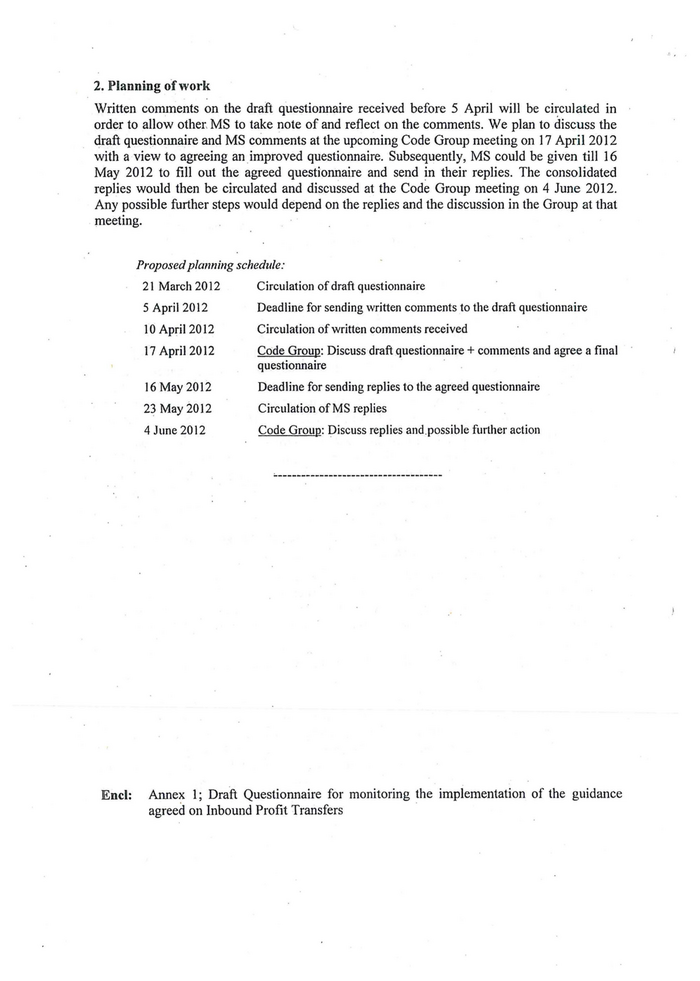
.. ' .ANNEX .D RAFT QUESTIONNAIRE FOR MONITORING THE IMPLEMENTATIÖN OF THE GUIDANCE AGREED ON ][NBOUND PROFIT TRANSFERS 1. Does your Member State provide for an exemptio.n of inbound intercompany dividends if certain conditions are met? [yes] .. la. Ifyes: )> Do you have a minimum [no] participation requirement. Is this düferent for domestic, EU, treaty or 3rd country participations? Piease explain. )> Is there a minimum holding [no] period? ls this different for domestic, EU, treaty or 3rd country participations? Piease explain. )> Is there a "subject-to-tax" or [no] "minimum effective taxation" requirement? If yes, please .. explain. )> Does the "subject-to-tax" or [N/A] "minimum effective taxation" requirement apply to the . subsidiary only or also to indirect subsidiaries. Piease explain. );> Is a tax credit for underlying [N/A] taxes available in case one of the above requirements is not met? Piease explain.
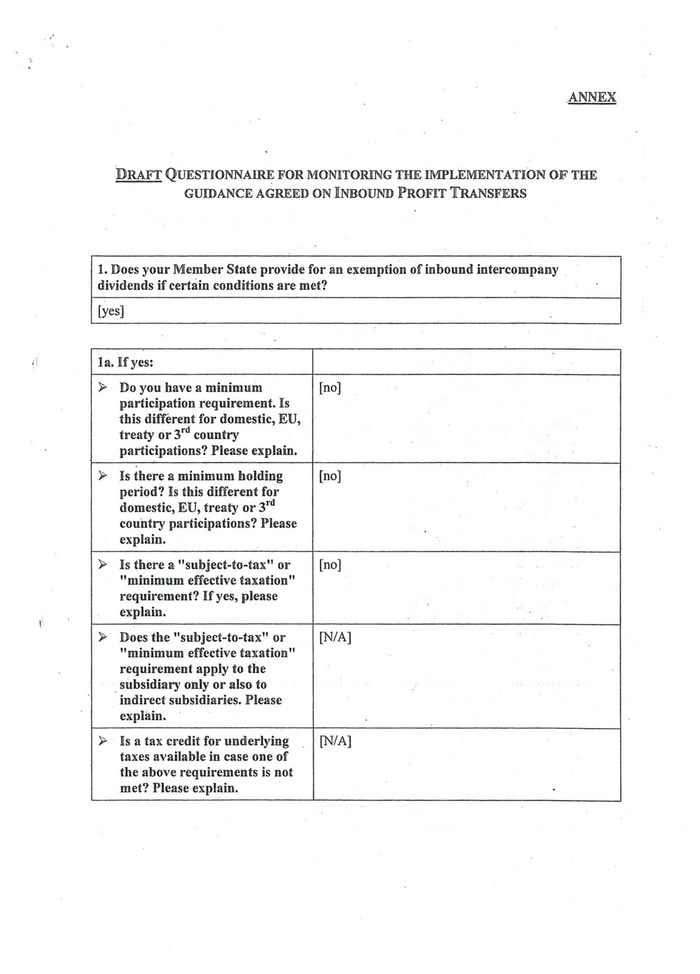
; I 1 b. If no, please briefly explain your credit system. [N/A]. 2. Does your. Member State provide for an exemption of capital gains on participations if certain conditions are met? · :i ~. [yes]. : .. : 2a.lfyes: .' );> Is tbere 'a minimum [no] participation requireinent. Is tMs different for domestic, EU, treaty or 3rd co"iint"r.Y part.icipat"ions? Piease explain. );>. Is tbere a minimum holding [no] period? Is tbis different for domestic, EU, treaty or 3rd country participations? Piease expl~in. ; ·' >- · Is thcre a i•subject-to-tax" or · [no] "mi~imu~ eff.ective taxation" requirement? If yes, please explain. >- Is a tax credit for underlying [N/A] taxes available in case one of the above rcquirements is not met? Piease explain. 2b. lf no, please briefly explain bow capital gains are taxed (as ordinary profits or under a specific capital gains tax). [N/A] 3. Is a deduction available for realised capitallosses concerning the participations? If ycs please briefly cxplain the conditions and methodology for calculating the loss (acquisition minus sales price or different). [No]
